”Nothing can bring you peace but yourself” – Ralph Waldo Emerson
I’m creating an online journaling workshop, and here’s why:
I’ve always leaned heavily into the camp of “the unexamined life is not worth living” (SOCRATES my friends). I know there are plenty of people out there who don’t examine much of anything, and I’m not saying their lives are not worth living. Ahem. But so far as we know, this is the only life we have, and there’s so much to discover and understand about our own innards. “Be a detective in your own life”, as Sarah Silverman says on her podcast.
Your brain is all you have. To wit:
“Our minds are all we have. They are all we have ever had. And they are all we can offer others. This might not be obvious, especially when there are aspects of your life that seem in need of improvement—when your goals are unrealized, or you are struggling to find a career, or you have relationships that need repairing. But it’s the truth. Every experience you have ever had has been shaped by your mind. Every relationship is as good or as bad as it is because of the minds involved. If you are perpetually angry, depressed, confused, and unloving, or your attention is elsewhere, it won’t matter how successful you become or who is in your life—you won’t enjoy any of it” – Sam Harris
Emphasis is mine.
Sam Harris is touting meditation, but he could be talking about journaling as well. Your mind is what you bring to everything you do and every interaction you have. It’s a vast, mysterious storehouse of all you are and have ever been. All you could be. All you hold dear, and all you fear. Journaling is a method for better understanding yourself, your mind, and your life. According to Tim Ferriss, “It’s the most cost-effective therapy I’ve ever found”.
I started writing in a journal as a teen. Not because I was so wise that I intuited it would help me navigate dysfunction. I don’t know why I started. Maybe because I love paper and notebooks and fountain pens and sitting at desks. Whatever the reason, I’m glad I did. Coming to the page helped me accept and process pain and confusion and my fear of fully blossoming for many years. It helped me come to understand who I was, and to feel okay about it. I think I might owe it my life.
Here we are decades later, and I’ve been reading about journal writing for the first time since 1981 when I read The New Diary, a gift from a friend. Reading about journaling has ignited my brain. Everything resonates so hard because it confirms what I’ve known and experienced for decades. I knew that journaling had helped me—had in fact shaped me. Now I’m reading about studies that clearly show the benefits of putting pen to paper, and the testimonies of people who’ve been shaped as I have. I’m excitedly seeing connections between what I’m reading and the ideas of far-flung artists and writers: Lynda Barry, Verlyn Klinkenborg, Joan Didion, Marcus Aurelius, Milton Glaser, Sam Harris and Anne Lamott, to name a few. I’m sure there’ll be more.
I had a friend who made fun of me for journaling back in the day. I think he saw it as navel-gazing and pseudo-writing—not intellectually rigorous enough maybe. Too subjective, too reflective, too me me me. At the time, I was still prey to the tyrannical enchantment of what real writing was according to the very white, very male “canon”, and I cared about my friend’s opinion. That was then, this is now. Those are oranges; these are apples. Journal writing isn’t meant to be good writing, the way we learned to do it in school. It’s a different fruit altogether.
About the word “journaling”: I’m not a fan. If you google “what is journaling” you’ll see very prim, neat entries carefully laid out in 5 x 8 inch notebooks, everything ordered and pretty. There are lots of pastel colours involved, and a codified look to any embellishments. Kind of the cousin of scrapbooking, only involving young women with long hair and glasses looking reflective. Thinking deep thoughts.
But “journaling” it is—I use that term because there’s not much else.
I’m including a few old journal entries here, which feels weird. It was hard to find examples I was willing to show, that weren’t too revealing about myself or others. These aren’t necessarily “representative”... 95% of the real estate in my journals is taken up with nothing but writing. I don’t necessarily draw as a matter of course. I guess I just wanted to show that journal entries don’t need to be neat! Unless you want them to be. Anything goes.
HARDCORE JOURNALING
That’s not really the name of the workshop. Or is it? I don’t want to scare anyone away, but I do want to go deep and cover a lot of ground. And avoid the stereotype I describe above. This type of journaling doesn’t need to be pretty—quite the opposite.
This kind of journaling is more process than product. That’s the point.
I was going to write about all the things that journaling can do for a person when I found the following in the introduction to The New Diary:
I would add that it’s a place all your own where you can safely divulge secrets you keep even from yourself, which can be immensely beneficial—revolutionary even. It’s a place where you build a relationship, with yourself.
In my journal I do not just express myself more openly than I could to any person; I create myself –Susan Sontag
Studies show it’s beneficial to your health—both mental and physical—to get your feelings down on paper, even if you immediately burn that paper. Journaling has been shown to help with your immune system, your nervous system, your sleep and your working memory. It helps with stress, anxiety, and depression. It builds self-reliance, brings you greater clarity, and helps you become more self-aware. WHAT’S NOT TO LIKE?
Here’s the ultimate recommendation: Mahatma Gandhi kept a diary and considered it a moral duty to do so. In one of my favourite Substack newsletters, Noted, Jillian Hess has written a lovely post about Gandhi’s Sacred Diaries.
A caveat: if you’re dealing with serious mental health issues, please seek professional counsel. Yes, research shows that journaling can help with anxiety and depression. But there are times in everyone’s life when outside help is called for, and you should heed that call.
For the time being and on the wise advice of a certain maven who runs The Creative Good, I’m going to put together a trial run workshop that’ll be one to two hours long, though I already have enough material for something much more extensive. It’ll be a pay-what-you-wish type of situation, and will probably happen in the fall.
I’ll cover things like:
Different approaches/ways to journal
Blocks you might have and methods to find your way past them
Helpful techniques and exercises to employ when desired/needed
Materials, and ways in which you might want to embellish (or not)
How journaling can help you, and enrich your life
Research about the very real benefits
AND SO MUCH MORE (<—I’m supposed to write that)
WHO’S IN?
I’ll leave you with the beginning of an entry from my birthday in 1997 that includes another Ralph Waldo Emerson quote, and some hilarious artwork by David P. Smith.
BIG FAT BACKYARD ART SALE!
The first of many obnoxious Instagram reels promoting the sale. The date has now been set, btw.
On Saturday July 22nd, David P. Smith and I will be having an art sale in our back yard at 2614 Forbes Street, Victoria BC. There will be:
Paintings
Prints
Collages
Photographs
LPs and CDs
Collage greeting cards
100 Days of The Artist is Present book (only 4 copies left)
Other bits and bobs
CLICK HERE TO SEE MORE!—including David’s paintings and music.
I dug up every available/sellable piece of artwork I could find and hung it on my studio walls like a maniac. I also have unframed paintings and prints that I’ll happily offer up as well. I’m not the greatest at self-promotion so things tend to hang around, and I assure you that prices will be slashed! Plus you’re more than welcome to purchase before the backyard sale. Contact me through my website, or hit reply to this email.
The back yard, soon to be filled with art and music and whatnot. COME ON DOWN!
Bye! Thanks for reading. If you find value in my posts, please consider supporting me and my work by becoming a paid or free subscriber:
Or please like this by clicking on the little heart, share it, or make a comment—that helps support my work, too. Go on, take a chance—CLICK A HEART WHY DON’T YOU? Or LEAVE A COMMENT!
Buy my Collage Class—$40 CAD for a one-hour prerecorded download. People like it!
Buy my book 100 Days of The Artist is Present
Visit balampman.com
There's always Instagram

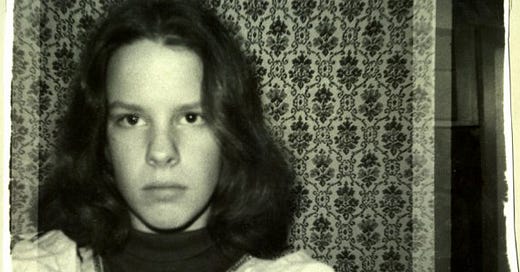



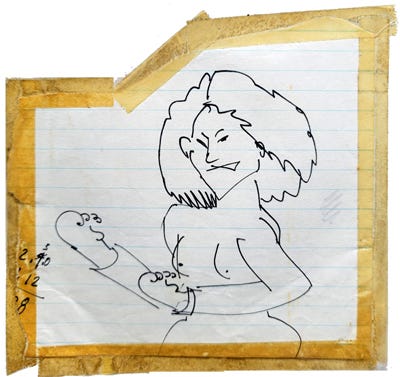
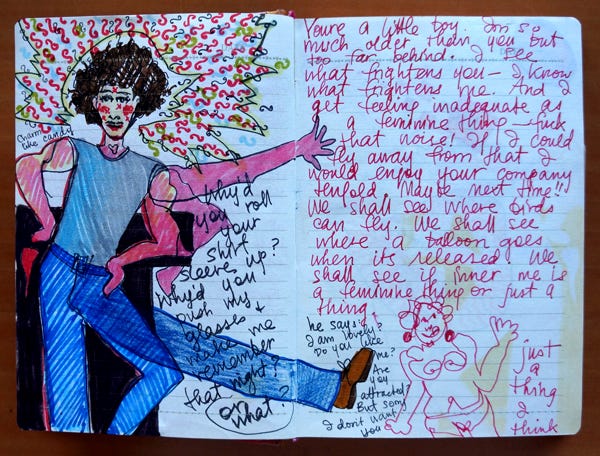
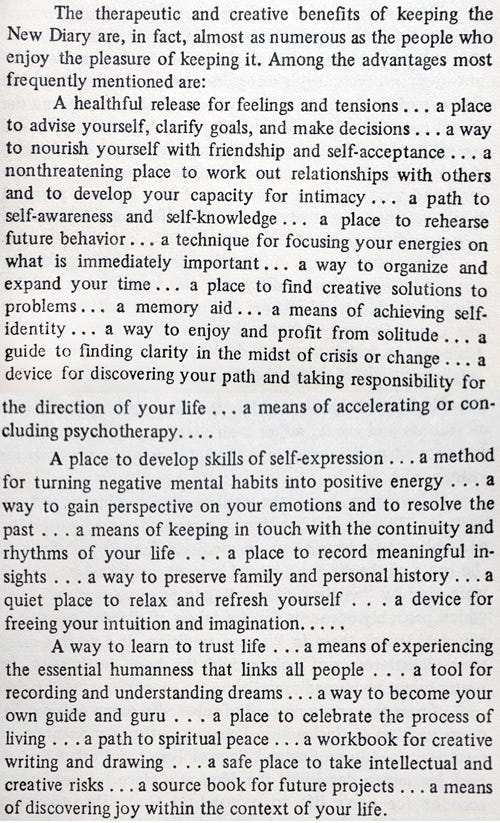
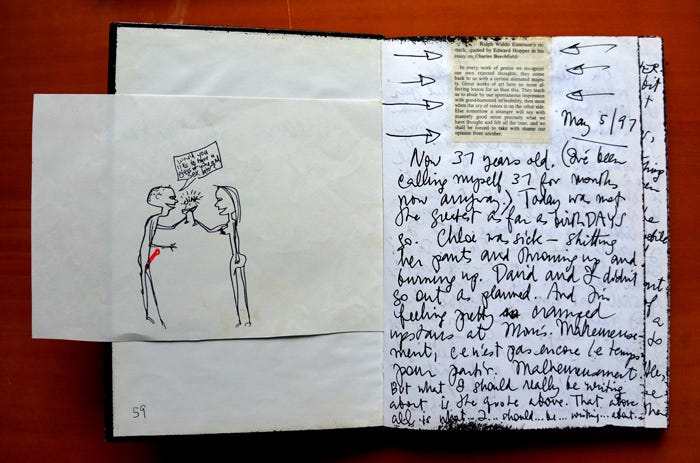
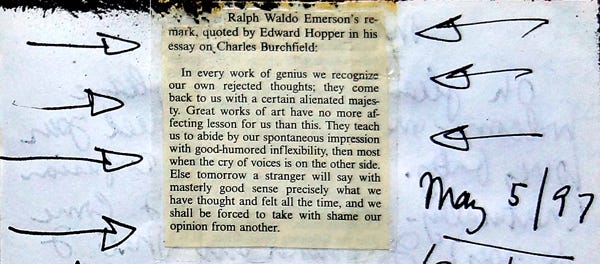


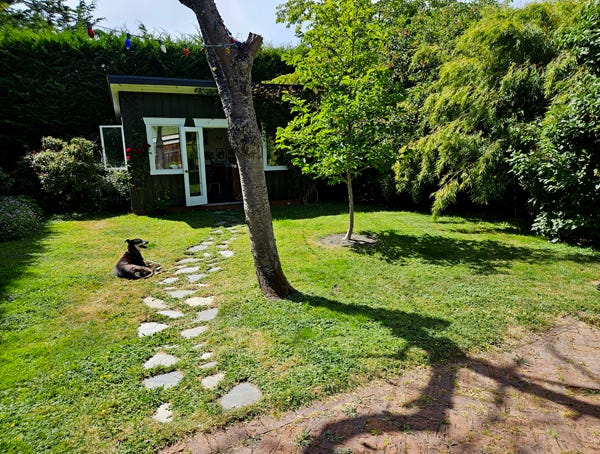

“I think he saw it as navel-gazing and pseudo-writing—not intellectually rigorous enough maybe. Too subjective, too reflective, too me me me.”
Whew! As an obsessive journaler for 40-plus years I think that’s the point! I can be all me me me in my journal every morning and then move on for the rest of the day.
Thanks for a great post BA! Did you see Jillian’s early this week on how Gandhi said it is our moral duty to keep a diary?
This is awesome. Last year I took a monasticism course during my senior year of college where I was required to journal every 30 minutes of my waking hours for 3 months. Those were maybe the best 3 months of my life!